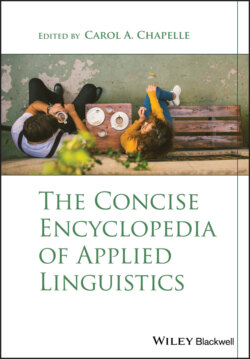Читать книгу The Concise Encyclopedia of Applied Linguistics - Carol A. Chapelle - Страница 191
Motivation
ОглавлениеMotivation is a complex psychological construct that acts as a direct determinant of second language (L2) achievement, which is why much attention has been paid to this individual variable in second language acquisition literature. Gardner (1985, p. 10) defines motivation as “the extent to which the individual works or strives to learn the language because of a desire to do so and the satisfaction experienced in this activity.”
The widespread interest in motivation is reflected in the hundreds of books and articles published on the topic over the past decade (Dörnyei, Henry, & Muir, 2016). Although the factors that may account for individual differences in L2 learning are as manifold as there are people, motivation is crucial, especially in classroom language learning. Studies carried out in many different contexts have demonstrated that there is a clear correlation between motivation and language achievement.
For decades motivation was regarded as a relatively stable learner trait, but from the 1990s onward research on motivation has undergone a shift toward a more dynamic construct. Although language learners are usually highly motivated when they set out to learn a foreign language, the challenge lies in maintaining that motivation. Yet the dynamic character and temporal variation inherent to students' motivation have been somewhat neglected in studies so far. The mastery of an L2 is a long process which usually takes several years and in which students' motivation fluctuates (Dörnyei, MacIntyre, & Henry, 2015). Research is also currently more grounded in the context where the learning takes place and Ushioda (2009, p. 216) in fact suggests that “we need to understand second language learners as people, and as people who are necessarily located in particular cultural and historical contexts.”
